Hey research rockstars! Feeling overwhelmed by a mountain of academic papers? Elicit, the AI-powered research assistant, promises to be your trusty sidekick, summarizing studies, extracting data, and synthesizing info at lightning speed.
What is Elicit?
Elicit is an AI-powered research assistant born at Ought, a non-profit research organization focused on developing AI that benefits humanity. Elicit has recently become an independent public benefit corporation, continuing its mission to “scale up good reasoning using machine learning, starting with researchers”.
Think of Elicit as your research superpower. It helps you navigate the vast ocean of academic literature by conducting deeper searches than traditional tools. Unlike those relying on titles and keywords, Elicit scans entire articles, uncovering relevant studies you might otherwise miss.
But Elicit doesn’t just find papers; it helps you understand them too. Short summaries, powered by large language models, give you a quick grasp of each article’s key points. This lets you efficiently decide which publications deserve a deeper dive and filter out irrelevant ones, saving you precious time and energy.
Pros & Cons
Pros
- Deeper search: Elicit searches the full text of articles, not just titles and abstracts, so you’re more likely to find relevant research.
- AI-powered summaries: Elicit provides short summaries of articles, written by a large language model, which can help you quickly understand the main points of an article.
- User-Friendly: Intuitive interface for easy navigation.
- Up-to-Date Information: Linked with Semantic Scholar for current data.
- Free Access: Offers a robust free plan with ample credits for average use.
- Constantly improving: Elicit is a relatively new tool, but it is constantly being updated and improved.
Cons
- New tool: Because Elicit is new, it may not be as well-known or established as some other research tools.
- Limited scope: Elicit currently only searches for academic articles, so it may not be useful for other types of research.
- Potential bias: As with any AI-powered tool, there is a potential for bias in the search results or summaries.
- Limited Free Credits: High-volume users may need the paid plan.
- Export Restrictions: Exporting data requires the paid plan.
How to Use Elicit to Find Papers? Step-by-Step Guide
Step 1: Sign Up or Log In
To begin, navigate to elicit.com and either sign up for an account or log in if you already have one.
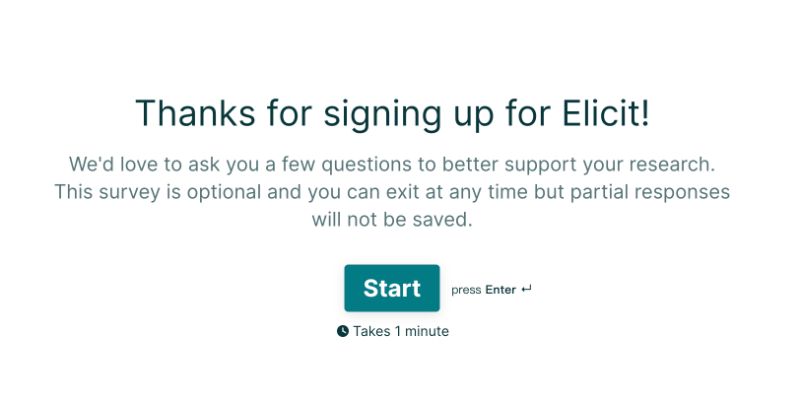
Step 2: Explore the Homepage
Upon logging in, you’ll be greeted by the homepage of Elicit. Here, you’ll find a context box where you can input your research question or keywords to start your exploration. Don’t worry about being too precise; Elicit is robust and can understand even with minor spelling errors.
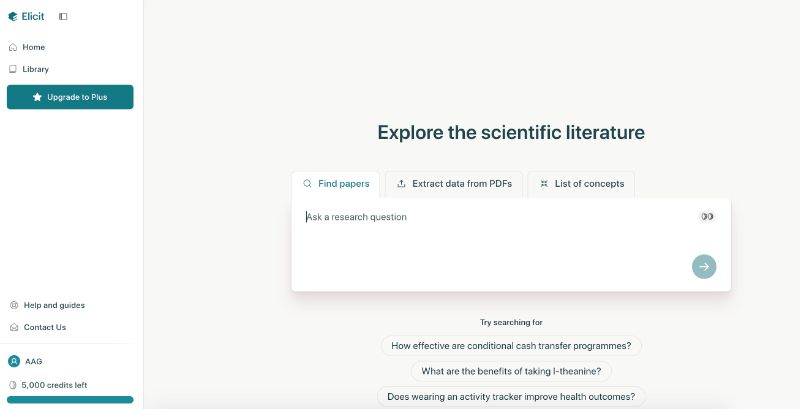
Step 3: Ask Your Research Question
Type in your research question or relevant keywords related to your area of interest. For instance, if you’re exploring sustainable agriculture practices, you could inquire about the impact of vertical farming on food production and environmental sustainability.
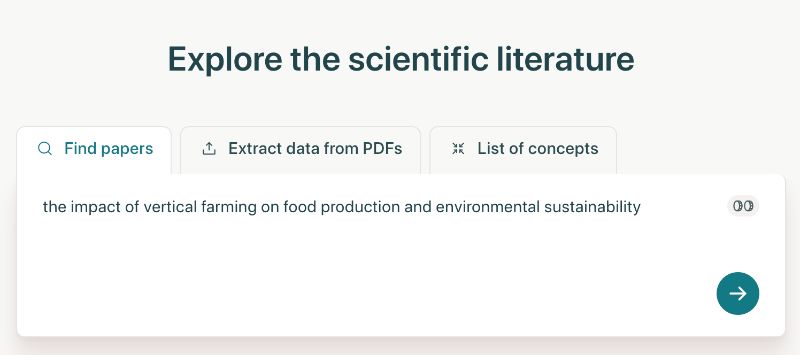
Step 4: Review the Summary and Results
After inputting your query, Elicit will provide you with a summary of the top results, akin to a mini literature review.
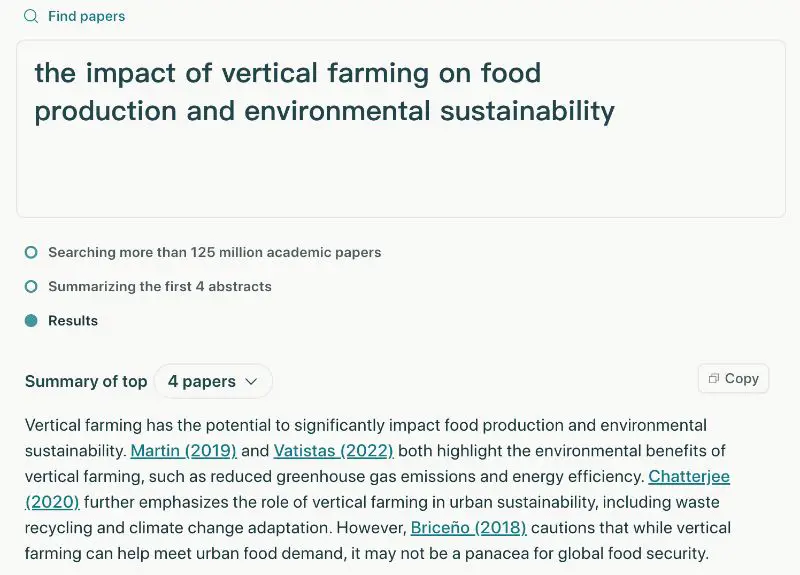
Below the summary, you’ll find a table displaying the literature matrix, which includes details such as paper titles, authors, origins, and abstract summaries.
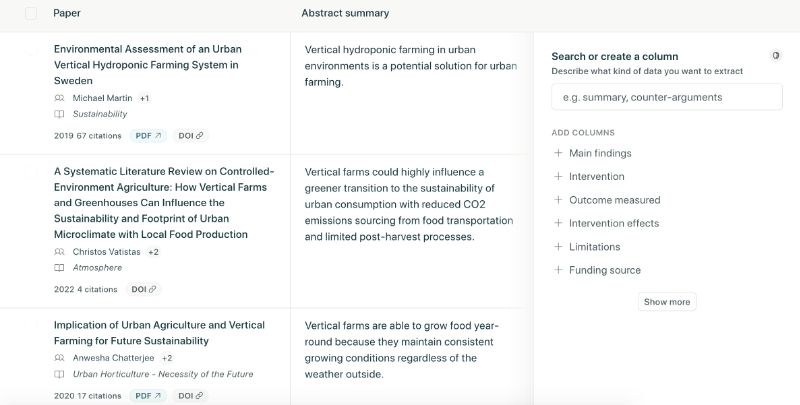
Step 5: Apply Filters and Sort
You have the option to apply filters and sort the results according to various criteria such as publication year, study type, or relevance. This allows you to narrow down the search results and focus on the most pertinent literature for your research.
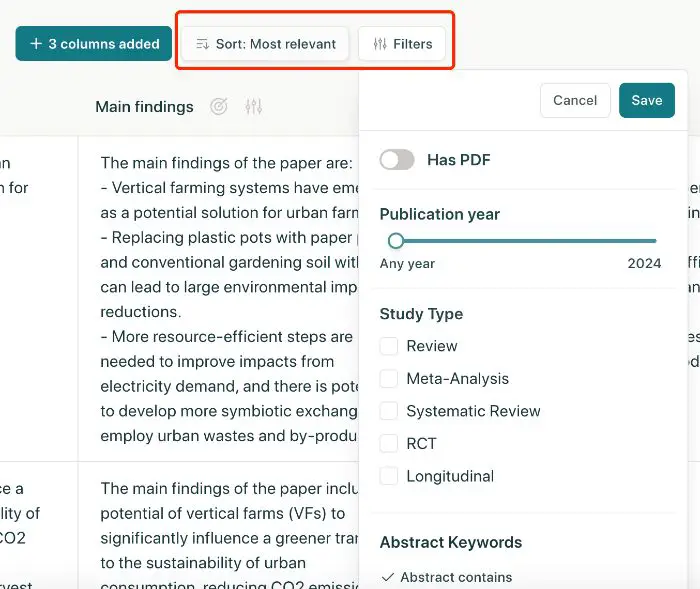
Step 6: Customize Your Matrix
You can personalize the matrix by including columns for specific aspects such as intervention, outcome measured, study design, and duration. This allows for more tailored organization and analysis of your research findings.
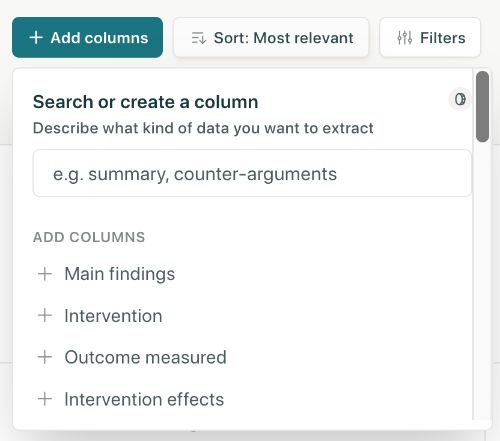
⚠️It is worth mentioning that some content may display a red exclamation mark in the upper right corner. This is to alert you that the answer may not be accurate, and it is recommended to check the source.
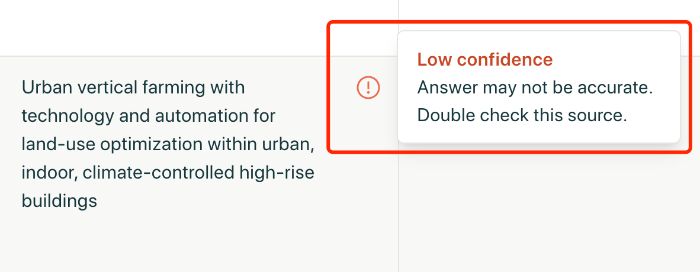
Step 7: Export Your Findings (Optional)
While the free plan allows for extensive use, the paid plan offers additional benefits, including the ability to export your findings into a CSV format. This feature facilitates further analysis and integration into other tools such as spreadsheet software or bibliography programs.

Step 8: Upgrade for Enhanced Features (Optional)
Consider upgrading to the paid plan if you require more extensive research capabilities, such as conducting meta-analyses or systematic reviews. The paid plan provides additional monthly credits and advanced features to streamline your workflow.
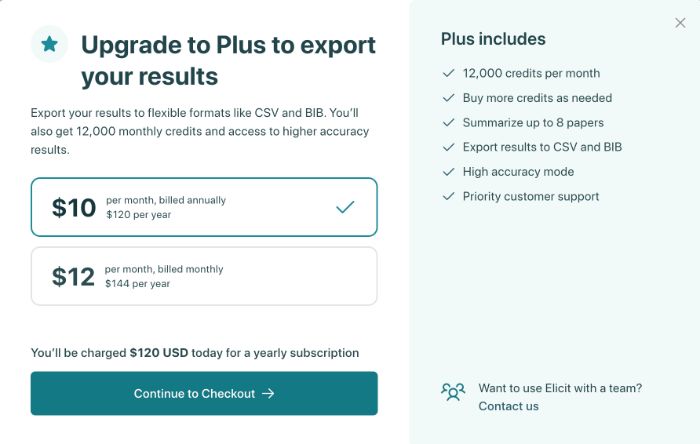
Features of Elicit AI Researcher
Now, let’s explore the fundamental features that empower your research journey:
- Deep Search: Elicit goes beyond the basics. It digs deep into articles, finding connections and uncovering studies you might’ve overlooked. With filters and clever search techniques, it’s like hitting the research jackpot every time.
- AI-powered Summaries: Say goodbye to long reads. Elicit’s summaries give you the gist of each article in a flash, saving you time and helping you decide what’s worth delving into deeper.
- Customizable Research Matrices: Build your own tables, tailor your analysis, and visualize your data for clearer insights.
- Exact Data from PDFs: No more manual data entry. Elicit pulls out stats, quotes, and figures straight from PDFs, making your analysis a breeze.
- List of Concepts: Elicit spots recurring themes and key terms across multiple sources, giving you a bird’s-eye view of your research landscape and highlighting any gaps in knowledge.
- Easy Export and Organization: Export your findings in a snap, customize your research matrices, and keep everything organized for easy reference.
- Create a Personalized Research Environment: Stay in the loop with customized notifications and save time by revisiting your favorite searches in a click.
Use Cases
Literature Reviews
Elicit shines when tasked with compiling literature reviews. Its ability to deeply search and summarize articles saves hours, making it easier to gather and synthesize relevant studies. This is invaluable for researchers starting a new project or students crafting their thesis background.
Academic Research
For scholars exploring cutting-edge developments in computer science and biomedical fields, Elicit offers unmatched access to current studies. The tool’s integration with Semantic Scholar ensures researchers can stay at the forefront of their discipline, with all necessary data at their fingertips.
Grant Proposal Preparation
Grant writers can leverage Elicit to quickly find supporting studies, data, and the latest advancements to strengthen their proposals. Its AI-powered summaries help in citing pertinent research without the need to comb through each paper in detail.
Systematic Reviews and Meta-Analyses
Elicit’s comprehensive search capabilities and customizable research matrices are perfect for conducting systematic reviews and meta-analyses. Researchers can efficiently organize vast amounts of data, analyze study designs, outcomes, and interventions, streamlining the review process.
Educational Material Compilation
Educators and curriculum developers can use Elicit to compile up-to-date reading materials for courses, especially in rapidly evolving fields. The tool’s search efficiency ensures that course readings include the latest research findings and insights.
Professional Development
Professionals seeking to stay abreast of the latest trends and research in their field can utilize Elicit for continuous learning. Its easy-to-use interface and concise summaries make it feasible to integrate into a busy schedule, ensuring ongoing professional growth.
Plan & Pricing: Finding Your Perfect Elicit Match
Elicit is available for free, and also offers a paid plan. Let’s take a look at the features of the free and paid versions, and who they are suitable for.
Free Plan
Start your Elicit journey risk-free with the free plan. It grants you 5,000 credits one time, allowing you to explore its capabilities and see if it meshes with your workflow.
This plan is ideal for researchers starting smaller projects or for those working within a budget. You’ll have access to essential features like source finding, integration, data extraction, and synthesis, empowering you to conduct effective literature reviews with a manageable number of sources.
Paid Plan
For heavy-duty research, the paid plan unlocks Elicit’s full potential. With a monthly subscription of $12, you receive 12,000 credits, perfect for tackling comprehensive literature reviews, dissertations, or meta-analyses.
The real game-changer is the export feature, allowing you to delve deeper into your findings by sorting, analyzing, and effortlessly integrating them into your bibliography software.
This plan caters to power users seeking maximum research efficiency, especially those dealing with vast amounts of literature that require systematic synthesis.
Elicit Plan Comparison
| Feature | Free Plan | Paid Plan (Monthly) |
|---|---|---|
| Pricing | Free | $12 |
| Credits | 5,000 (estimated 3+ months) | 12,000 |
| Source Finding & Integration | Yes | Yes |
| Data Extraction & Synthesis | Yes | Yes |
| CSV Export | No | Yes |
| Advanced Search & Summarization | Limited | Powerful |
| Question Answering | Limited | Powerful |
| Paper Access | Basic | Expanded |
| Ideal for | Small projects, budget-conscious research | Large projects, complex analysis, power users |
User Reviews
Elicit gets a thumbs-up from users for its regular updates with new features, which are like little gifts for the research community. These additions keep things fresh and show that the team is really tuned into what users need. It’s like having a friend who’s always bringing you cool new stuff to try out.
But, like any tool, it’s not perfect. Some users wish they could un-star items once they’ve selected them, or have better ways to organize their starred items. It’s kind of like trying to tidy up your room but not having anywhere to put all your favorite things. Plus, there are some areas of the website that could use a bit of a makeover to make them more user-friendly. It’s like finding hidden treasure in your backyard but having to dig around a lot to uncover it.
Despite these little quirks, users love how Elicit breaks down complicated papers into easy-to-digest summaries. It’s like having a cheat sheet for all those dense research articles, making it a breeze to decide if a paper is worth diving into deeper. But hey, even with its quirks, Elicit is still a valuable tool for getting through those research papers with a little less hassle.
Elicit Alternatives: 7 AI Research Tools
| Tool Name | Focus | Strengths | Weaknesses |
|---|---|---|---|
| Consensus | Research Paper Search & Analysis | Deep search capabilities, AI-powered analysis, citation network visualization | Limited research focus, no paper summarization |
| ChatPDF | AI-powered Writing & Summarizing | Long-form content creation, AI-powered summarization | Limited collaboration features, focus on content creation |
| Bit.ai | Research Collaboration & Knowledge Management | Collaborative research workspace, annotation tools, knowledge base building | Free plan limitations, learning curve |
| Research Rabbit | AI-powered Writing & Research Management | AI-powered writing templates, research management tools, citation manager | May not be ideal for all types of research projects |
| Scholarcy | Academic Writing Assistance & Reference Manager | AI-powered writing assistance, reference formatting, citation suggestions | Limited integration with other research tools |
| Scite | Open Access Research Paper Discussion & Annotation | Open community discussion, real-time annotation, highlighting | Dependent on active community discussion |
| SciSpace | Collaborative Research Platform & Literature Review Tool | Collaborative research environment, AI-powered literature review tools, project management | May require some technical expertise |
FAQs
Is Elicit safe to use? Does it raise any ethical concerns?
Elicit uses large language models trained on massive datasets of text and code. While generally safe, potential biases within the training data might influence its outputs. It’s crucial to critically evaluate Elicit’s responses and use it responsibly.
Does Elicit violate copyright laws?
No, Elicit accesses and processes papers legally through partnerships with academic publishers and open access archives. However, remember to always follow copyright guidelines when using information obtained through Elicit.
Can I use Elicit for any type of research?
Elicit is currently optimized for academic research using published papers. It might not be suitable for other research methods like surveys or experiments.
How does Elicit compare to traditional research methods?
Elicit can accelerate literature reviews and information gathering, but it shouldn’t replace critical thinking and in-depth analysis. Use it as a tool to enhance your research, not as a substitute for your own intellectual engagement.
Is Elicit the future of research?
AI research assistants like Elicit hold great potential to revolutionize how we conduct research. However, they are still evolving, and responsible use alongside strong analytical skills remains crucial.
Wrapping Up
From its robust features to its user-friendly interface, Elicit has proven itself to be a valuable asset for researchers of all backgrounds and disciplines. Its ability to streamline the research process and provide quick access to relevant information is truly commendable.
So, if you’re ready to take your research game to the next level, don’t hesitate to give Elicit a try. With its continuous updates and dedication to user satisfaction, Elicit is poised to remain a top contender in the realm of research tools. Embrace the power of Elicit and unlock new possibilities in your academic and professional endeavors today!
